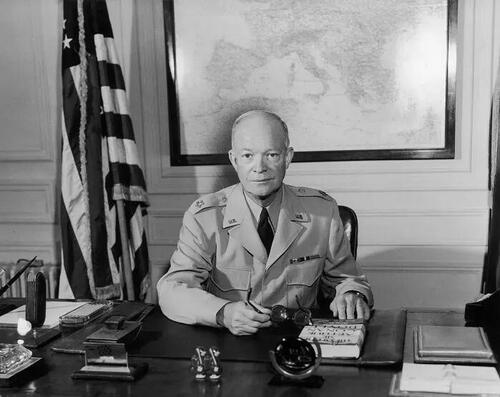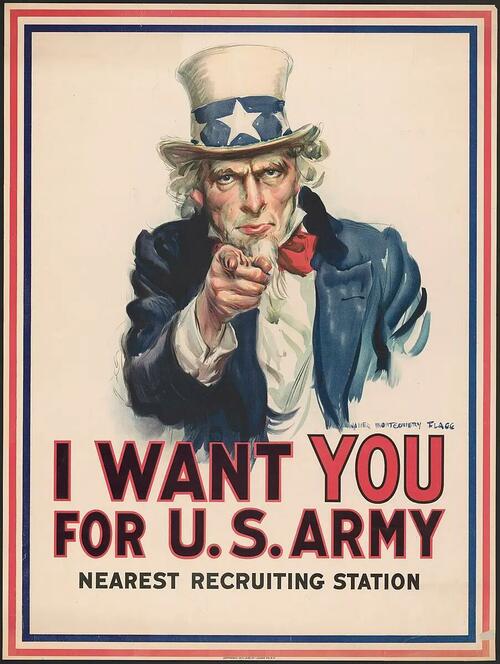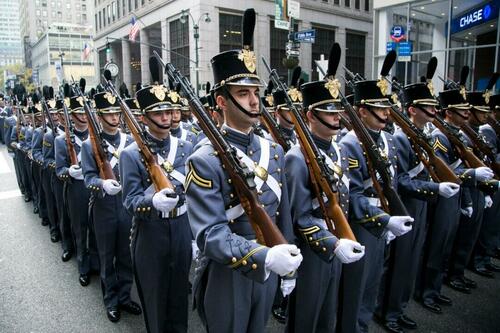The Heart Behind The US Army’s 250 Years Of Service
Authored by Dustin Bass via The Epoch Times (emphasis ours),
“For God’s sake, fire!” A return volley of musket and rifle fire boomed across the Concord River near the North Bridge. “The shot heard round the world” had just been unleashed upon the 220 British soldiers by the colonial militia and minutemen. The volley sent the British retreating to Concord and then to Lexington, where they had earlier fired upon and dispersed the 70 local militia, killing eight and wounding 10. Their return to Lexington would be the start of a 12-mile scramble back to Boston.
Throughout the night of April 18 and the early morning hours of April 19, 1775, word had spread in the Boston area that the British were coming to confiscate or destroy the locals’ gunpowder and materiel in Concord. By the time British soldiers reached the North Bridge, hundreds of militia members were out in force. By the time the British began their retreat back to Boston, thousands descended upon them, firing from behind trees, stone walls, houses, and buildings. What began as an act of suppression by imperial troops turned into a route by a mass of colonial volunteers.
This was the beginning of arguably the greatest military upset in history. Four days later, the Massachusetts Provincial Congress attempted to organize the disjointed militias across several colonies to create the Army of Observation. It was not until June 14 that the 13 colonies agreed to combine their disparate militias into one fighting force: the Continental Army.
This decision to combine militias marked the beginning of what would become known as the United States Army. Though originating from very humble beginnings, the Army would end the Revolutionary War with quite a first feather in its cap: defeating the British—the most powerful military at the time. To witness its rise from scrappy underdog during the 18th century to becoming a peer of imperial states in the 19th century to becoming the greatest military power the world has ever witnessed by the 20th century is to witness the rise of America itself.
Indeed, just as neither could have existed without the other, the heart behind their existence was mutual. To understand that mutuality, one must recall the volunteers who arrived in Lexington and Concord and all along the 12-mile strip now known as Battle Road.
Worth Fighting For
Before the start of the American Revolution, the colonies had successfully practiced self-government for 150 years by way of Great Britain’s unofficial policy of salutary neglect. The British Americans had established a way of life in the colonies, and it was believed that, although living 3,000 miles from London, they were represented fairly in Parliament. The colonists—-despite the name and despite the distance from the mother country—believed they were English citizens, and therefore subject to all the rights and privileges thereof. These—though certainly not at the same level as we appreciate today—included freedom of movement, religion, and trade; equality before the law; and political participation. In 1765, when the colonists were informed that Parliament passed the Stamp Act, it began a decade of changing perspectives and, eventually, a change of loyalty.
This change of loyalty to Parliament, and eventually the monarchy, however, was never directed toward what the colonists believed were rightfully theirs: the rights and privileges of British subjects. The heart behind what led to the commercial boycotts and the political gatherings and pamphleteering of the late 1760s and early 1770s was the same as that which led to their taking up arms in 1775. What had been gained by their ancestors over the past 150 years was much too precious to relinquish.
A 250-Year Legacy
Undoubtedly, those who hurried toward Lexington, Concord, and the road to Boston, had their beliefs summarized precisely by Patrick Henry, less than a month before that historic day. He stated, “Is life so dear, or peace so sweet, as to be purchased at the price of chains and slavery? Forbid it, Almighty God! I know not what course others may take, but as for me, give me liberty or give me death!”
This sense of urgency to protect what Americans have viewed as their most precious commodities—the right to be free in their persons, equality before the law, and the power of consent—has fueled the purpose behind the United States Army for 250 years.
The U.S. Army has long served to protect its people and the core values of this nation. It befriended the French and the Spanish to defeat the British during the Revolution. It sailed with the Navy to humble the Barbary pirates. It fought to fend off the British again during the War of 1812. For nearly a century, it protected settlers against tribal attacks. It defeated the Mexicans and opened the path across the continent. It fought, defeated, and forgave its southern compatriots in the War Between the States. It enforced the Monroe Doctrine by ousting the Spanish from the Western hemisphere. It rescued the world from militarism—twice. It bled and died in the struggle against communism, resulting in the ultimate fall of the Soviet Union. It has pursued terrorists around the globe.

American and Soviet tanks face off at Checkpoint Charlie in Berlin, in 1961. Public Domain
The American conviction that people generally should be free and equal has led the U.S. Army across the continent and across the globe. As with America itself, there have been missteps. In step with its nation’s geostrategic goals, the Army has often followed an idealistic and, at times, wrongheaded approach in the name of freedom and equality, and at times more crudely for reasons of trade and expansion.
Even in these missteps, this now greatest military power in the world has never been subject to itself, but to the American people. Consider that during its 250 years—a year longer than its nation’s existence—it has never attempted a coup. What nation—powerful or weak—can make such a boast?
A Promise Kept
When it comes to the pride of America, what is more prominent in our minds than the military? And this pride does not simply stem from its incredible victories across two and a half centuries, from Trenton to Baghdad. Or its brilliant soldiers and commanders—certainly far too many to name. Furthermore, a third of our 45 presidents—George Washington, James Monroe, Andrew Jackson, William H. Harrison, Zachary Taylor, Franklin Pierce, Ulysses S. Grant, Rutherford B. Hayes, James A. Garfield, Chester A. Arthur, Benjamin Harrison, William McKinley, Theodore Roosevelt, Harry S. Truman, and Dwight D. Eisenhower—served in the Army. The fact that none of those presidents gained the highest political office via a coup only further highlights that aforementioned shared purpose between the state and the military. Washington’s resignation from his military position at the end of the Revolutionary War set this high and noble standard.

Supreme Allied Cmdr. Gen. Dwight D. Eisenhower at his desk in the Marly headquarters, near Paris. Hulton Archive/Getty Images
Yes, the United States stands for freedom and equality. “All men are created equal,” wrote our famous statesman, Thomas Jefferson. “They are endowed by their Creator with certain unalienable Rights, that among these are Life, Liberty and the pursuit of Happiness.”
But those rights must be defended. The initial disdain the Founders, among them Jefferson, had for standing armies soon melted away. The initial understanding the militia and minutemen volunteers possessed in April 1775, that what they held most dear—the rights and privileges of English subjects—was worth fighting and dying for, matured into the Continental Army on June 14, and became, through thick and thin, the United States Army—the greatest military power on Earth and, since 1973, an all-volunteer army—endeavoring to protect, through great sacrifice, what we hold most dear—the rights and privileges of American citizens.
Throughout this 250-year existence, side-by-side with its country, has been the motto, a practical statement of faith, that encapsulates the purpose, the heart, behind the Army’s existence: “This We’ll Defend.” It is the “This”—freedom, equality, and national sovereignty—that makes such a promise worth keeping.

Tyler Durden
Sun, 06/15/2025 - 07:00
The post <a href=https://www.zerohedge.com/political/heart-behind-us-armys-250-years-service target=_blank >The Heart Behind The US Army’s 250 Years Of Service</a> appeared first on Conservative Angle | Conservative Angle - Conservative News Clearing House
Continue reading...

